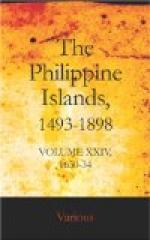In the beginning of this triennium, as the fathers of Ilocos were going to their province, two or three of them feared the horror of the journey by land, which is terrible. Accordingly, as they found a suitable boat, father Fray Diego Abalos prior of Narbacan, father Fray Juan Gallegos, [68] prior of Laguag, and father Fray Francisco del Portillo, [69] prior of Purao, taking the provision for their convents, went along the coast to Ilocos. But so furious a storm struck them, that they gave themselves up as lost. Accordingly, as servants of God, they had recourse to Him, sincerely confessing themselves and praying earnestly—as well as their terror allowed—to God to beg pardon for their sins. The Sangleys already, with loosened hair (which means their last hope gone), did not attempt to do a thing in the champan, for they thought that they could not escape from it. At last, encouraged by the fathers, after setting a scrap of sail, they yielded to the force of the stern-wind, and in less than thirty hours reached the Chinese coasts. They made more than three hundred leguas in that short time and route, which, even in fine weather, would take fifteen or twenty days, or one or two months. They landed, where no little danger awaited them, as the people tried to kill them. But at last the Lord’s mercy was not found wanting in that country, for through it they went from land to land, until they reached Macan, a city held by the Portuguese in the country of China. They were succored there with great generosity, for in works of charity the Portuguese are most generous. In Manila, they were thought to have been drowned. As such, the masses and suffrages that are wont to be said in this province of the order, for the religious who die in it, were said for them in all the convents. Afterward, the Portuguese who came to Manila informed Ours of the [above] event, whereat all rejoiced greatly; for those regarded as lost were religious who were held in much esteem. Two of them soon came, namely, father Fray Diego de Abalos and father Fray Juan Gallegos The third, father Fray Francisco del Portillo, went to the island of Hermosa, which belonged then to our Spaniards, and took possession of a convent with the solemnity decreed by law. Then he came back, and all three returned to their priorates, to which others had already been appointed by our father provincial.
The enemy from Jolo had often made incursions, to the great loss of the islands; for they caused many deaths, made many captives, and occasioned not few expenses, which had been incurred for his Majesty in opposing them, but all to no purpose. For either the Spaniards did not try to look for them, or did not find them, or indeed, when they met them, the enemy took to their heels; for on the one hand their boats are swifter, and on the other they come more as soldiers than our men, who seem to have inherited the carelessness and phlegm of the country. And truly, I think injustice has been done to the Joloans,




